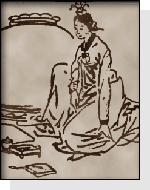- Park In- hwan (1926~1956)
- Park Su- geun (1914~1965)
- Kim Yu- jeong (1908~1937)
- Lee Hyo- seok (pen name Gasan) (1907~1942)
- Kim Dong- myeong (Choheo) (1901~1968)
- Han Yong- un (Buddhist name Manhae) (1897~1944)
- Namgung Eok (pen name Hanseo) (1863~1939)
- Yun Hui- sun (1860~1935)
- Yu In- seok (pen name Uiam) (1842~1915)
- Kim Byeong- yeon (pen name Nango) (1807~1863)
- Nam Gu- man (pen name Yakcheon) (1629~1711)
- Heo Mok (pen name Misu) (1595~1682)
- Heo Gyun (pen name Gyosan) (1569~1618)
- Heo Cho- hui (pen name Nanseolheon) (1563~1589)
- Sinsaimdang (1504~1551)
- Kim Si- seup (pen name Maewoldang) (1434~1493)
- Won Cheon- seok (pen name Ungok) (1330~ ?)
- Lee Seung- hyu (pen name Dongangeosa) (1224~1300)
Heo Cho-hui (pen name Nanseolheon) (1563~1589)

Female poet active midway through the Joseon dynasty hailing from Gangneung,
her real name was Chohui with the pen names Nanseolheon and Gyeongbeon.
She was the daughter of Sung ConfucianistHeo Yeop, and the older sister of Heo Gyun. She was taught Chinese poems by Lee Dal (pen name Songok),
one of the three famous poets active during the Joseon dynasty.
She demonstrated her talent in writing Chinese poems.
At 8, she composed a Sangryangmun (a writing inserted on to the ridge beam) at Baekokru pavilion of Gwanghanjeon. In 1577 (10th year of King Seonjo),
she was married to Kim Seong-rip, but their relationship was not good.
She gave birth to two daughters but lost both of the babies. To make matters worse, her maiden family members suffered from being imprisoned, and her younger brother Heo Gyun was exiled. This combination of tragedies caused her to die young at 27. She expressed her sufferings from marital life and her maiden family in poems to console herself. Her poems are sensitively and delicately worded, demonstrating a woman´s unique sentiment and lamentations.
Later, her brother Heo Gyun gave a portion of her works to Ming´s envoy Ju Ji-beon. Thus, her poetry book titled Nanseolheonjib was published and highly praised in China. In 1711, it was also published in Japan by Bundaiya Jiro, and was widely read. She has handed down 142 poems such as ‘Yuseonsi’, ‘Binyeoeum’, ‘Mangseonyoyuheung’ and ‘Dongseonyo’, as well as Gasa (verse) such as ‘Gyuwonga’ and ‘Bongseonga’.
She gave birth to two daughters but lost both of the babies. To make matters worse, her maiden family members suffered from being imprisoned, and her younger brother Heo Gyun was exiled. This combination of tragedies caused her to die young at 27. She expressed her sufferings from marital life and her maiden family in poems to console herself. Her poems are sensitively and delicately worded, demonstrating a woman´s unique sentiment and lamentations.
Later, her brother Heo Gyun gave a portion of her works to Ming´s envoy Ju Ji-beon. Thus, her poetry book titled Nanseolheonjib was published and highly praised in China. In 1711, it was also published in Japan by Bundaiya Jiro, and was widely read. She has handed down 142 poems such as ‘Yuseonsi’, ‘Binyeoeum’, ‘Mangseonyoyuheung’ and ‘Dongseonyo’, as well as Gasa (verse) such as ‘Gyuwonga’ and ‘Bongseonga’.
최근 업데이트 2023-01-10


